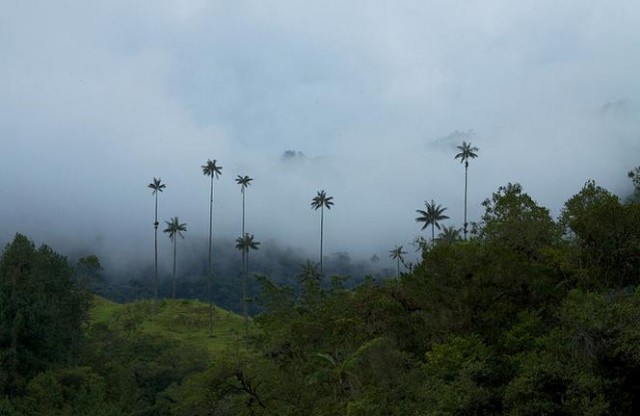Dispatches of Disparity from South America
by Laura Yan

A bus station, Ecuador
I was waiting for a night bus to my next destination. There were no other travelers around me, only tired women with their babies, men with dropped eyes. Downstairs, in a basement, I paid 25 cents to use the bathroom, and a small stack of toilet paper. The woman at the entrance guarded a narrow table, vending small snacks, candy and gum and toilet paper.
When I came out, she noticed my bracelet, a gold-colored metal bracelet I bought from an artisan in Popayan. She motioned to her own thick wrist. I let her try it on. Cuanto cuesta? She asked. I didn’t remember, exactly, 16000 Colombian pesos, eight dollars. I just have three, she said, and held up her small stack of coins. Her voice was wistful. I smiled, maybe I misunderstood her Spanish. I tried to explain that it was personal, not for sale. But an unsettling guilt trailed me back upstairs.
A few months later, I lost the bracelet.

Popayan, Colombia
A Colombian man and I were driving through the gorgeous green fields of the countryside to his hacienda. The day before, I took a riding lesson with him, in the ranch where he kept only a few horses and his new house was being built. He showed me around the huge complex, with its colonial style open courtyard, big rooms just being sketched out in wood and cement.
We passed small wood houses on the winding dirt road. That’s where my horses live, he joked. They were the houses of local farmers, who had many children and no education, he said.
I saw the pristine stalls for his horses later, snorting, shining animals, with impassioned eyes and trophy ribbons. He made the feed for the horses himself, adding salt or sugar and honey for flavor.
The hacienda was hundreds of years old, a colonial mansion that could have been a museum. The furniture was antique, the dining room set with heavy, elegant silver, and in the bedroom stood an empty baby carriage, delicate baby blue and full of lace. He married his wife here, he told me. No one lived here now, except for the servants who swept away the dust and cared for the horses.

Lima, Peru
In Miraflores, the bland, upscale tourist district, I asked a security guard in the modern beachside mall recommendations for an inexpensive lunch. He gave me directions to a small restaurant off the main avenue. Locals in construction uniforms ate there. The set lunch cost 10 soles ($3.60). I caught the attention of an eccentric old man sitting a few tables away. We chatted-I half understood his Spanish, but understood when he invited me to a coffee, somewhere nice. We walked.
This is the first time in 20 years I’ve walked around Miraflores with a woman, he said. The Peruvian women called him “viejo loco.” He pointed out fancy coffee shops that refused to serve him, even when he showed that he could pay. The owner of where we were going was far more educated, liberal, he said. The old man worked at a university as a messenger, but it meant being at a university. When I told him how much I loved the long bus rides on my travels, he said he preferred flying, with educated people.
I’ve lived a sad life, he said, over coffee. I’m old but I don’t feel old. His hands shook and he became silent, the lines on his face quivering, desolate. The coffee cost 6 soles. Though he’d invited me, when I offered to pay, he accepted.
•
A woman with wild, dark hair, wearing only a pair of rough shorts, breasts exposed, bare footed, wandered unevenly through a busy shopping avenue in the city center. No one looked at her.

Copacabana, Bolivia
In a small resort town for local vacationers and many, many backpackers, a sad, Peruvian man dragged his shoeshine kit before the patrons of the many gringo cafes and restaurants lining the Main Street. A foreign girl explained to her friends: He says he has no money to get back to Peru. I feel bad…but there’s nothing I can do.
One of her friends supported her: It’s not your problem. Another said: You should tell him you don’t have enough money to get back to Germany. They laughed.

La Paz, Bolivia
Countless shoeshine boys, wearing knit ski masks over their faces (to avoid recognition) awaited on the busy main avenue and plazas in La Paz. Each shoeshine cost 2 Bolivianos (30 cents). They worked quickly, sitting down on the small stool, spreading their legs, and polish, polish, polishing shiny leather with a worn rag.
•
A young girl, maybe 10, danced on a pedestrian overhead crossway. Only it wasn’t really a dance, more of a sad, absent minded shuffle. Traditional music playing from a small stereo. Her basket for change was empty.
Laura Yan is somewhere in South America. Photo by mckay savage.
Support The Billfold
The Billfold continues to exist thanks to support from our readers. Help us continue to do our work by making a monthly pledge on Patreon or a one-time-only contribution through PayPal.
Comments